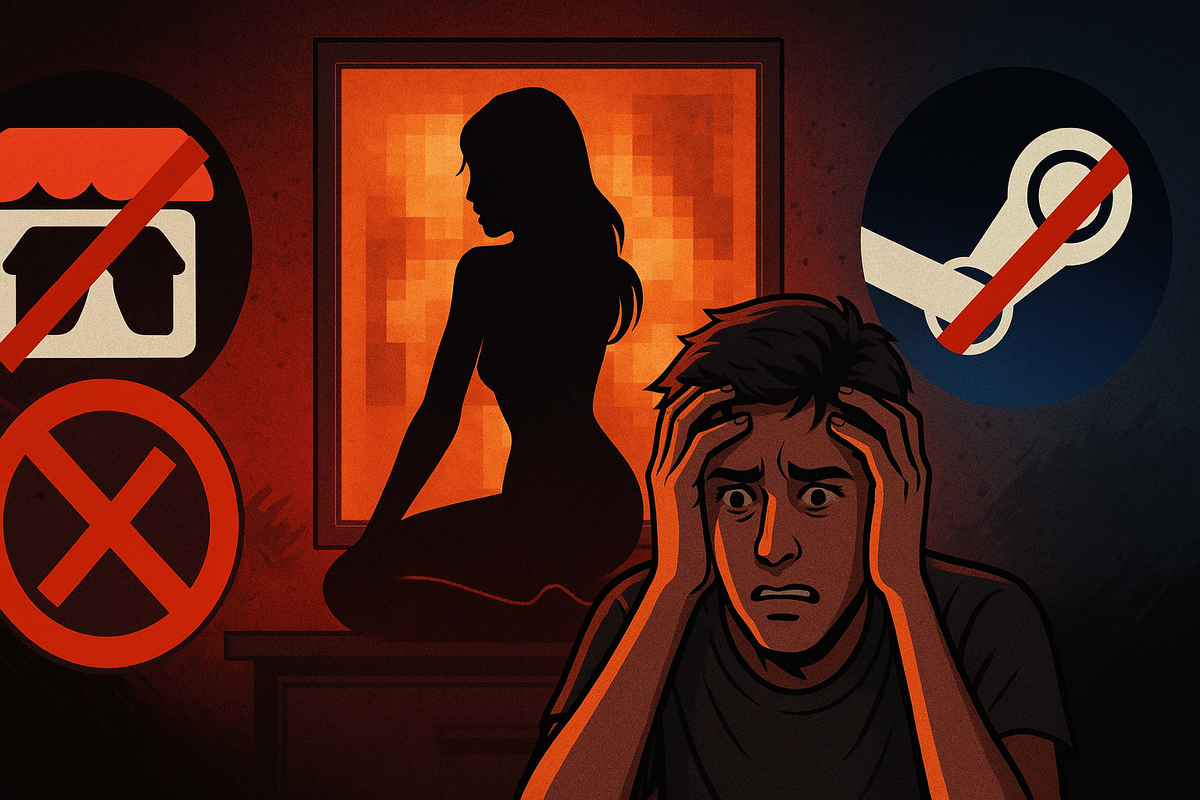How The Ban On Adult Games Can Turn into $100k MRR For Indie Devs

It's been quite a week for adult games. On July 24, 2025, Itch.io de-indexed all NSFW games from the platform. Steam also started removing some of its adult games from the platform as well. For many creators in the genre, this has caused both loss of income, frustration, and uncertainty. But there is a silver lining that we'll get to at the bottom of this article.
The whole movement started because of an organization called Collective Shout, which wrote an open letter to payment processors asking them to stop profiting from games depicting rape, incest, and child abuse. They cited one particularly violent game called "No Mercy" as an example. (We have no factual insights about this specific game—this information is based on hearsay from the group's excerpt.)
Both Steam and Itch.io responded by removing certain games and de-indexing others from their platforms. While this raises important concerns about whether payment processors should have the right to dictate what content is acceptable and what is not, it also offers the innovative kick in the butt that the gaming industry might desperately need.
In this article, we're going to cover:
- NextGasm - acting as a directory for NSFW games
- How NSFW creators can prosper from this situation
- How this disruption can innovate the entire gaming industry
NextGasm: Filling the Discovery Gap
With games being de-indexed, creators face a vital pain point: discoverability. How is a creator going to attract new players if potential customers can't find their games? Marketing and discoverability are already the biggest issues games face, and this platform purge is a huge slap in the face to developers who relied on these established channels.
NextGasm started out as a wiki for adult games and is now evolving into a comprehensive directory for games in response to these latest events. This represents an important step forward because, over time, a small specialized site like this can evolve into a vital resource for discoverability within the niche. The platform is completely free for games to register and list their titles, providing an immediate solution to the discovery problem.
The reason why NextGasm is being mentioned, despite it being new to the market, it represents part of a greater system that is going to impact NSFW Game Developers, and its concept can eventually impact all game developers. It works great when paired with a solution in place for payment processing that many developers are beginning to utilize effectively.
How NSFW Creators Can Solve Their Payment Issues
What might look like the end of the world could actually be a blessing in disguise—one that can both increase creators' revenue and help them keep more of their earnings. One of the most effective ways to achieve this is through Patreon's subscription model.
Steam takes 30% of all game revenue, which is quite significant. If your game makes $100,000, on Steam you keep $70,000. But with Patreon taking only 8-12%, you keep $88,000-$92,000. But doesn't Steam protect your game and prevent players from illegal distribution, handle refunds, and manage all those other backend concerns? Patreon can do the same if you connect it the right way. It takes a little bit more work, but the payoff can be worth it.
Patreon has a robust API, and with that API, you can check a member's tier and what they have subscribed to. From that information, you can create gated access to your content. See where I'm going with this? Let me explain the process:
Let's say you have three tiers on your Patreon for your game:
- Tier 1 (Free): Members get access to your Discord community
- Tier 2 ($3.99 per month): You publish a small comic related to your game, and members get exclusive access
- Tier 3 ($5.99 per month): Members get access to both your comic and the full game
If this sounds like something that interests you, here's how it's implemented:
- The player downloads your game launcher or demo
- When they open it up, the game asks for an access token from your Patreon. There's a link in your game that opens an OAuth flow to Patreon
- The player goes through the OAuth flow and receives their access token
- They enter the token in your game
- The token checks if they have an active subscription and verifies their tier level
- If they have the appropriate subscription, they can start playing! If they don't, they'll need to subscribe to access the content
Sound difficult? Not at all! In fact, we've done the majority of the technical work for you with these implementations. The first repository serves as your "frontend"—the website where you'll direct users to obtain their access tokens:
Frontend OAuth Handler:
https://github.com/Glitch-Gaming-Platform/Glitch-Node-Patreon
Then we have libraries that you can implement directly into your game. After the user gets their access token, these libraries will verify from within your game that they have the appropriate access level:
Game Engine Integrations:
- https://github.com/Glitch-Gaming-Platform/Glitch-Godot-Patreon
- https://github.com/Glitch-Gaming-Platform/Glitch-Unity-Patreon
- https://github.com/Glitch-Gaming-Platform/Glitch-Unreal-Patreon
And that's it! You're pretty much on your way to having a fully functional subscription-based game distribution system.
How This Can Innovate the Entire Gaming Industry
The gaming industry is in an odd and difficult place right now. Layoffs keep happening, games are failing to meet revenue projections, and market saturation is at an all-time high.
Film went through this transformation, books have navigated similar challenges, and music has been at a comparable inflection point as well. What did each of these industries do? They innovated and fundamentally changed their business models, distribution and marketing. It's time for games to do the same, and this disruption might be the catalyst.
The adult entertainment industry has always been years ahead of the mainstream market and not because they wanted to be, but because regulations and restrictions forced them to innovate. From camcorders to VHS, live streaming to web cams, and even credit card processing solutions—adult content creators were first to adopt these technologies. Now this same pattern might change how games as a whole conduct business and how much they'll rely on major platforms like Steam in the future.
Monthly Recurring Revenue for Games
Patreon represents the beginning of something transformative for games: the business model of predictable recurring revenue and the establishment of intellectual property that extends far beyond just the game itself. Traditionally, premium games make their money through one-time purchases, while free-to-play games typically generate revenue through advertisements or in-app purchases.
Either way, the revenue is inconsistent and unpredictable. Unpredictable revenue makes long-term planning extremely difficult and makes developers more reliant on outside funding sources like investors and publishers.
Monthly recurring revenue means that you can now have a reliable estimate for how much you're going to earn each month. From that baseline, you know exactly what resources you can and cannot afford.
As an indie developer, if you knew you were guaranteed $10k every month, would that give you a stable piece of mind for developing your game? For small indie developers, this model can put you in a position where you no longer NEED publishers or investors to survive and grow.
Transmedia and IP Development
The concept of transmedia isn't new as we've seen it successfully implemented in franchises like Minecraft, Doom, Tomb Raider and others as they get turned into movies. But transmedia can encompass a diverse range of content that includes:
- Episodes - Serialized story content
- Comics - Visual narratives that expand the game world
- Trading Cards - Collectible items featuring game characters and lore
- Physical Collectibles - Merchandise that extends the brand
- Behind-the-scenes content - Development diaries and creator insights
The key strategy is producing just enough content to keep players engaged and subscribed monthly. For example, if you create a comic series, you can structure access across different subscription tiers: the $3.99 tier gets immediate access, while the free tier receives it one month later.
Rather than releasing the entire comic at once, you can release it in small, digestible segments; perhaps one page per week, similar to how anime manga publishers might release 3-5 pages weekly. You want to provide just enough content to keep subscribers engaged while maintaining focus on your primary game development.
This approach dramatically increases the value of your game intellectual property at the negotiation table with publishers, investors, and potential acquirers, as having a robust, multi-faceted IP can be worth substantial money.
Audience Ownership and Control for Developers
Services like Patreon offer something incredibly valuable: nearly direct access to your audience. When you release content on Patreon, your subscribers receive email notifications. This means you can keep your community informed about what you're building—and that's powerful!
This is something other distribution services don't provide because direct creator-audience communication loosens platform control. Consider the advantages:
- You have nearly direct access to your audience without platform intermediation
- You have monthly recurring revenue that can support your lifestyle and development costs for years
- You have a robust intellectual property portfolio with transmedia extensions
- You have a platform like NextGasm helping discoverability
With these three pillars in place, do you really need to give up 30% of your sales to a platform? If you have a solid marketing plan in place (there's a free marketing plan generator designed specifically for games available), you can become entirely self-sufficient. Publishers and investors transform from "do or die" necessities into "nice to have" partners for indie developers.
Historically, adversity faced by adult content creators has forced them to innovate and lead the way that the rest of the industry eventually follows. Yes, adversity breeds the innovation and growth that entire industries desperately need.
Proof of Revenue Potential
The gaming industry can be historically risk-averse, with the number one question being "so who else has done this successfully?" before companies decide to take the leap themselves. If you need proof that adult game creators are already thriving with this model, here's a list of adult games with paying subscribers, some generating up to $100,000+ per month (over $1.2 million annually):
These numbers demonstrate that the subscription-based model isn't just theoretical but it's already generating substantial, sustainable revenue for creators who have embraced this approach. The platform restrictions that initially seemed like a catastrophe may actually be the push that the entire gaming industry needed to evolve beyond traditional distribution models.
The Dawn of Independent Gaming's Golden Age
What we're witnessing isn't just a temporary setback for adult game creators—it's the birth of a new paradigm that could fundamentally reshape how all games are developed, distributed, and monetized. The forced exodus from traditional platforms has accidentally created a blueprint for true creative and financial independence that extends far beyond adult content.
Think about it: we now have creators pulling in six-figure annual revenues while maintaining direct relationships with their audiences, owning their intellectual property outright, and having predictable income streams that make long-term planning actually possible. This isn't just sustainable—it's revolutionary.
The mainstream gaming industry, drowning in corporate layoffs, risk-averse publishing deals, and platform dependency, should be taking notes. While major studios scramble to hit unpredictable revenue targets and indie developers beg for visibility on oversaturated platforms, adult game creators are quietly building empires with 1,000 true fans paying $10 a month.
The tools are already here. The proof of concept is already working. The only question is: will mainstream game developers have the courage to break free from the traditional gatekeepers and embrace this model?




